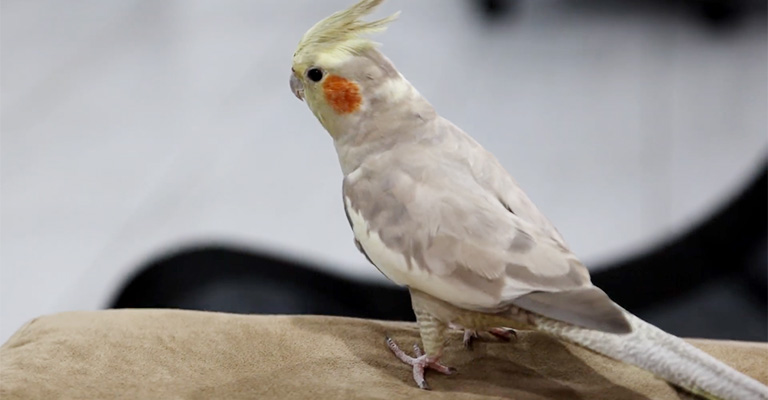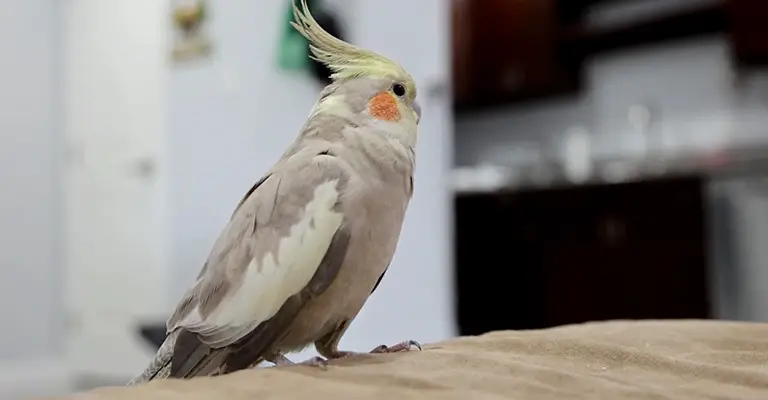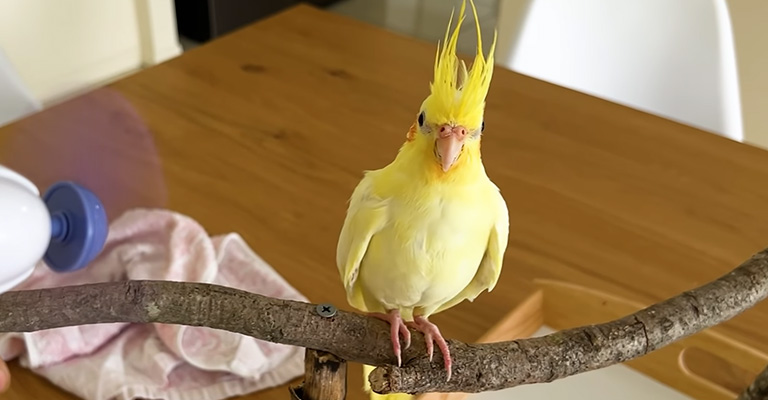Cockatiels, with their vibrant plumage and charming personalities, have become increasingly popular as pets. These small parrots are known for their playful nature and ability to mimic sounds, making them delightful companions for bird enthusiasts.
However, like any pet, cockatiels come with their own set of advantages and disadvantages.
In this article, we will delve into cockatiels as pets – pros and cons, helping you make an informed decision about whether these feathered friends are the right fit for your lifestyle.
On the positive side, cockatiels are highly sociable creatures that can form strong bonds with their human owners. Their affectionate nature and ability to learn tricks make them engaging and entertaining companions.
Additionally, cockatiels are relatively low-maintenance pets, requiring minimal space and simple dietary needs.
However, it’s important to consider the cons as well. Cockatiels can be noisy, especially during their morning and evening vocalizations. Let’s explore more!

Cockatiel as Pets: Pros and Cons
Similar to any other pet, keeping cockatiels as pets can be rewarding and challenging. Let’s explore the pros and cons of cockatiels as pets so that you can ultimately decide whether to get one or not.
Pros of Keeping Cockatiels as Pets
Cockatiels can make wonderful pets for several reasons. Here are some pros of having a cockatiel as a pet:
Affectionate Companionship
Cockatiels are known for their friendly and social nature. They can form strong bonds with their owners and enjoy spending time with them. They often enjoy being petted and can provide affectionate companionship.
Playful and Entertaining
Cockatiels are naturally curious and playful birds. They love exploring their surroundings and can provide hours of entertainment with their playful antics. They can learn tricks, mimic sounds, and even whistle tunes, making them a source of amusement for their owners.
Low Maintenance
Compared to some other pets, cockatiels are relatively low maintenance. They don’t require as much space as larger birds and can be kept in a reasonably sized cage.
They also have simple dietary needs, primarily consisting of a balanced seed and pellet mix, fresh water, and occasional fruits and vegetables.
Long Lifespan
Cockatiels have a relatively long lifespan for a pet bird, typically living for 15 to 20 years or even longer with proper care. This means they can be a long-term companion, providing years of joy and companionship.
Vocal and Interactive
Cockatiels are known for their vocalizations, including chirping, whistling, and even mimicking sounds and words. They can be quite interactive and respond to their owners’ attention and cues, making them engaging pets to interact with.
Easy to Train
Cockatiels are intelligent birds and can be trained to perform various tricks and behaviors. With patience, consistency, and positive reinforcement, you can teach them to step onto your hand, perch on your shoulder, or even perform simple tricks like fetching objects.
Beautiful and Unique Appearance
Cockatiels have a distinctive appearance with their vibrant plumage, crests, and expressive facial features. Their beautiful colors and patterns can add a touch of visual appeal to your home.
Also, cockatiels are smaller birds, making them suitable for people who may not have a lot of space for larger pets. They can comfortably fit in apartments or smaller homes without requiring a large dedicated area.
Gentle and Gentle-Natured
Cockatiels are generally gentle birds, which makes them suitable for families with children or individuals who prefer a pet that is not overly aggressive or demanding. They are less likely to bite compared to some other bird species.
Emotional Support
Cockatiels can provide emotional support and companionship to their owners. Interacting with a pet bird like a cockatiel has been shown to reduce stress, anxiety, and feelings of loneliness. Their presence can bring comfort and joy to your daily life.
Compatibility with Other Pets
Cockatiels can coexist with other pets, such as cats or dogs if introduced and supervised properly. With proper training and socialization, they can become part of a harmonious multi-pet household.
Furthermore, their long lifespan and need for mental stimulation necessitate a long-term commitment and dedicated care. By weighing these pros and cons, you can determine whether a cockatiel is the perfect pet for you.
Cons of Keeping Cockatiels as Pets

While cockatiels can make great pets, it’s important to consider some potential cons before deciding to bring one into your home. Here are a few cons to keep in mind:
Noise Level
Cockatiels are known for their vocalizations, which can include chirping, whistling, and even loud screeching.
While some people enjoy the sounds they make, others may find it disruptive or bothersome, especially in small living spaces or if you have neighbors in close proximity.
Mess and Feather Dust
Cockatiels can be messy pets. They produce feather dust, which can accumulate on surfaces and require regular cleaning. They also tend to scatter food and droppings outside of their cage, which means you’ll need to clean up after them frequently.
Time and Attention Requirements
Cockatiels are social birds that require regular interaction and mental stimulation. They need daily out-of-cage time to exercise and explore, as well as social interaction with their owners.
If you have a busy lifestyle or limited time to dedicate to your pet, a cockatiel may not be the best choice.
Potential for Biting
While cockatiels are generally gentle birds, they can bite if they feel threatened or stressed. This can happen if they are mishandled or if their boundaries are not respected.
It’s important to learn proper handling techniques and understand their body language to minimize the risk of being bitten.
Lifespan and Long-term Commitment
Cockatiels have a relatively long lifespan, which means they require a long-term commitment. They can live for 15 to 20 years or even longer with proper care.
Before getting a cockatiel, consider if you are ready for the responsibility and commitment of caring for a pet for such a significant period of time.
Potential Health Issues
Like any pet, cockatiels can be prone to certain health issues, such as respiratory problems, feather plucking, or nutritional deficiencies.
Regular veterinary check-ups and a proper diet are essential to ensure their well-being. It’s important to be prepared for potential veterinary expenses and to provide appropriate healthcare for your cockatiel.
Factors to Consider Before Choosing a Pet Cockatiel

Before choosing a pet cockatiel, it’s important to consider several factors to ensure that you can provide the best possible care and environment for your feathered friend. Here are some key factors to consider:
Time and Commitment
Cockatiels require daily interaction, mental stimulation, and socialization. They need time outside of their cage to exercise and explore, as well as regular attention from their owners.
Consider if you have enough time to dedicate to your pet cockatiel and if you can commit to their long lifespan, which can be 15 to 20 years or longer.
Space and Housing
Cockatiels need a spacious cage that allows them to move around comfortably. The cage should be large enough for them to fully extend their wings and have room for toys, perches, and food and water dishes.
Additionally, consider if you have enough space in your home to accommodate the cage and provide a safe and quiet environment for your cockatiel.
Noise Tolerance
Cockatiels are vocal birds and can make a variety of sounds, including chirping, whistling, and occasional loud screeches. If you have noise-sensitive neighbors or live in an apartment with thin walls, consider if you can tolerate the potential noise level.
Financial Considerations
Owning a pet cockatiel comes with financial responsibilities. You’ll need to budget for the initial cost of purchasing a cage, toys, and other supplies, as well as ongoing expenses such as food, bedding, and regular veterinary check-ups.
Additionally, be prepared for potential veterinary costs in case your cockatiel requires medical attention.
Allergies
Some individuals may have allergies to bird dander or feathers. If you or someone in your household has allergies, it’s important to spend time around cockatiels before bringing one home to ensure there are no adverse reactions.
Compatibility with Your Lifestyle
Consider if a cockatiel fits well with your lifestyle and household dynamics. Cockatiels thrive on social interaction and may not do well in homes where they are left alone for long periods.
If you travel frequently or have a busy schedule, you may need to make arrangements for their care and socialization.
Long-term Commitment
Cockatiels have a long lifespan, and they require a lifelong commitment. Make sure you are ready for the responsibility and commitment of caring for a pet for many years to come.
By carefully considering these factors, you can determine if a pet cockatiel is the right choice for you and ensure that you can provide a suitable and loving home for your new feathered companion.
FAQs
The cost of a cockatiel can vary depending on factors such as the bird’s age, color mutation, and where you purchase it from. On average, you can expect to pay anywhere from $100 to $300 for a pet cockatiel.
Cockatiels have a relatively long lifespan compared to some other pet birds. With proper care, they can live for 15 to 20 years or even longer. Providing a nutritious diet, regular veterinary check-ups, and a stimulating environment can help ensure a healthy and long life for your cockatiel.
Cockatiels are known for their ability to mimic sounds and even learn a few words. While they are not as proficient as some other parrot species, they can learn to whistle tunes, mimic household sounds, and occasionally pick up a few words with training and repetition.
Training a cockatiel requires patience, consistency, and positive reinforcement. Start with basic commands like step-up and step-down, using treats or praise as rewards. Gradually introduce more advanced tricks and behaviors.
A balanced diet is crucial for the health of your cockatiel. Their diet should consist of a high-quality seed and pellet mix specifically formulated for cockatiels. Additionally, provide fresh fruits and vegetables as occasional treats, ensuring they are safe and suitable for birds.
Final Words
Cockatiels can make wonderful pets for those who are willing to provide the necessary care and attention they require. Their playful and affectionate nature can bring joy and companionship to your life.
However, it’s crucial to consider the potential downsides, such as their noise levels and long-term commitment. Before bringing a cockatiel into your home, take the time to research their specific needs, including proper diet, cage setup, and mental stimulation.
Additionally, consider your own lifestyle and whether you have the time and resources to devote to their care. Furthermore, their long lifespan and need for mental stimulation necessitate a long-term commitment and dedicated care. By weighing these pros and cons, you can determine whether a cockatiel is the perfect pet for you.
With proper care and love, these beautiful birds can become cherished members of your family, bringing happiness and laughter for years to come.